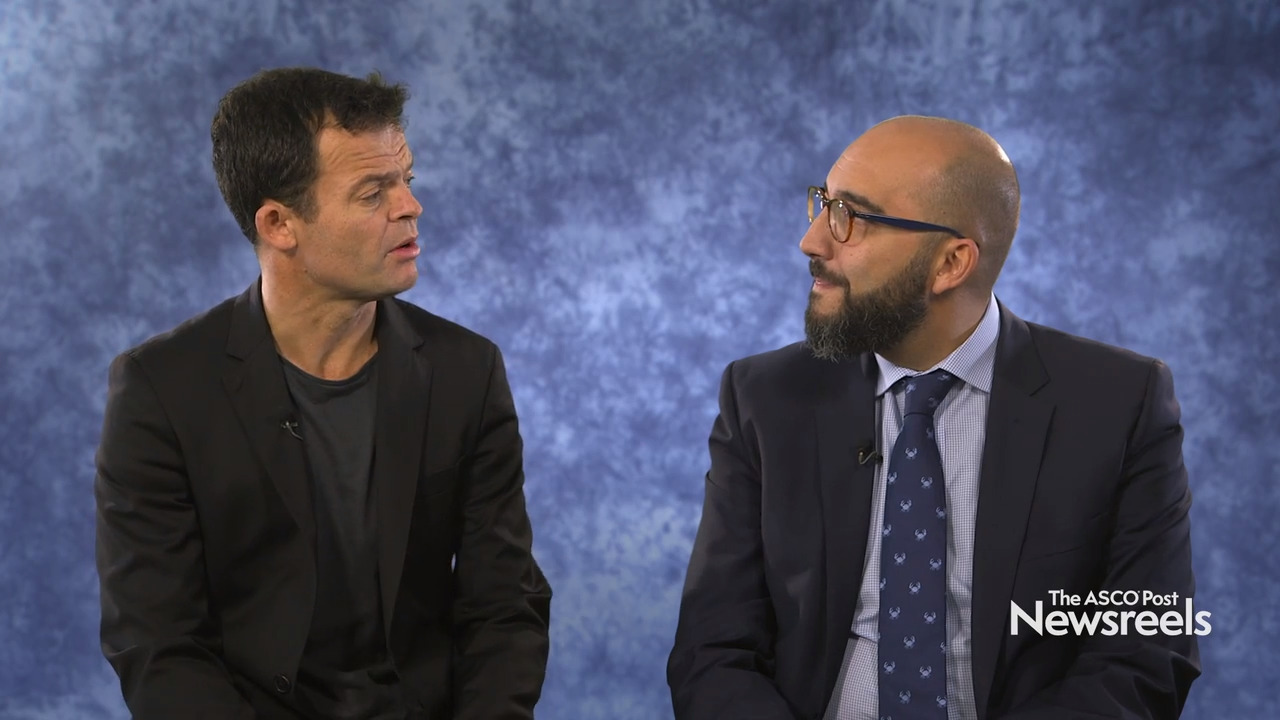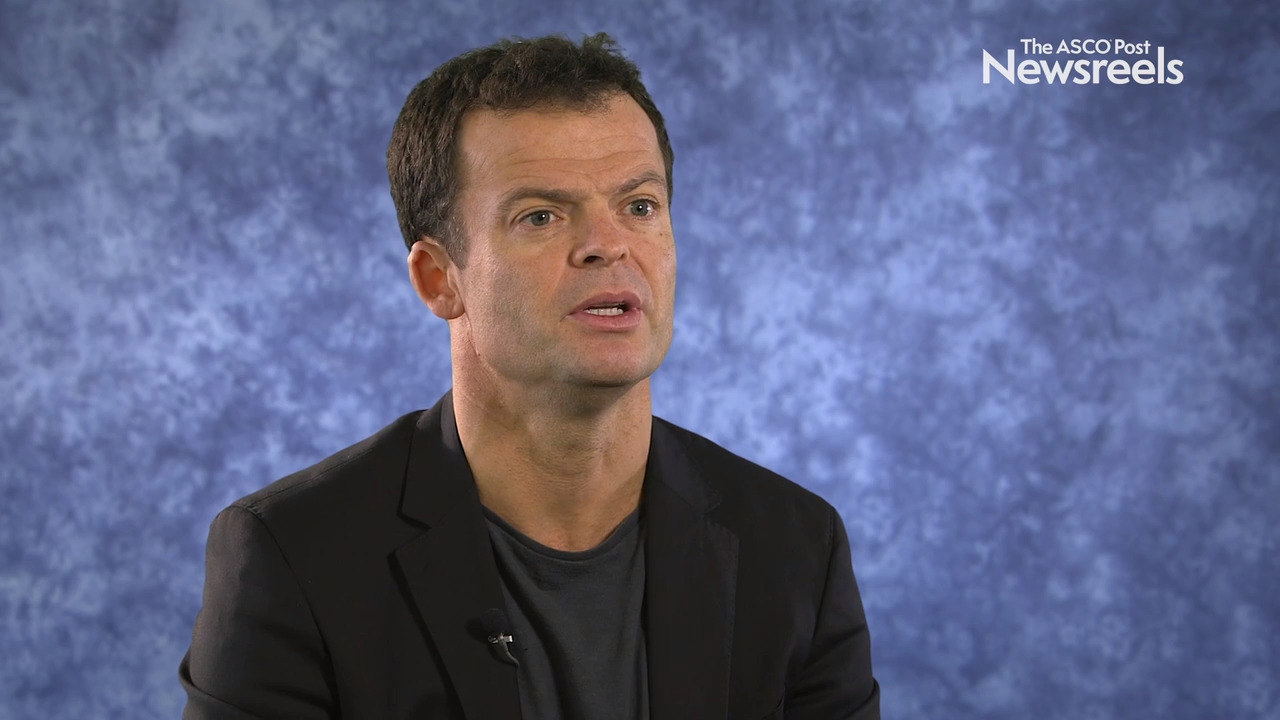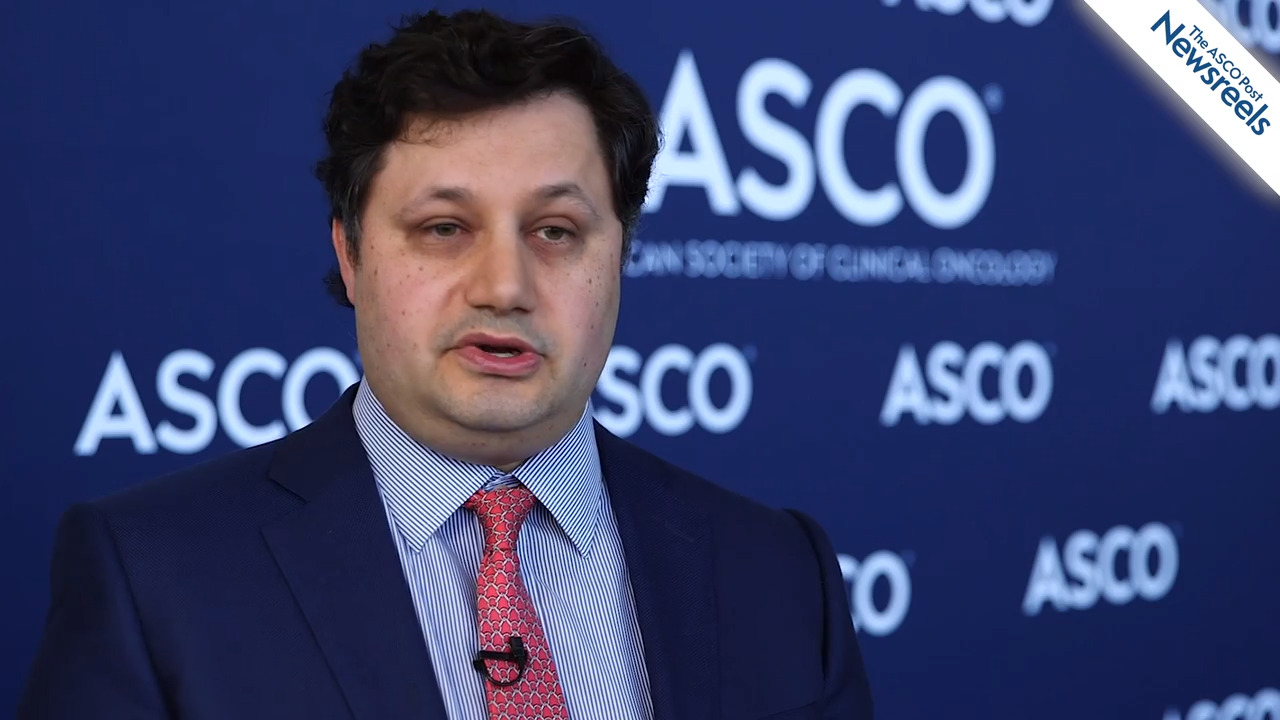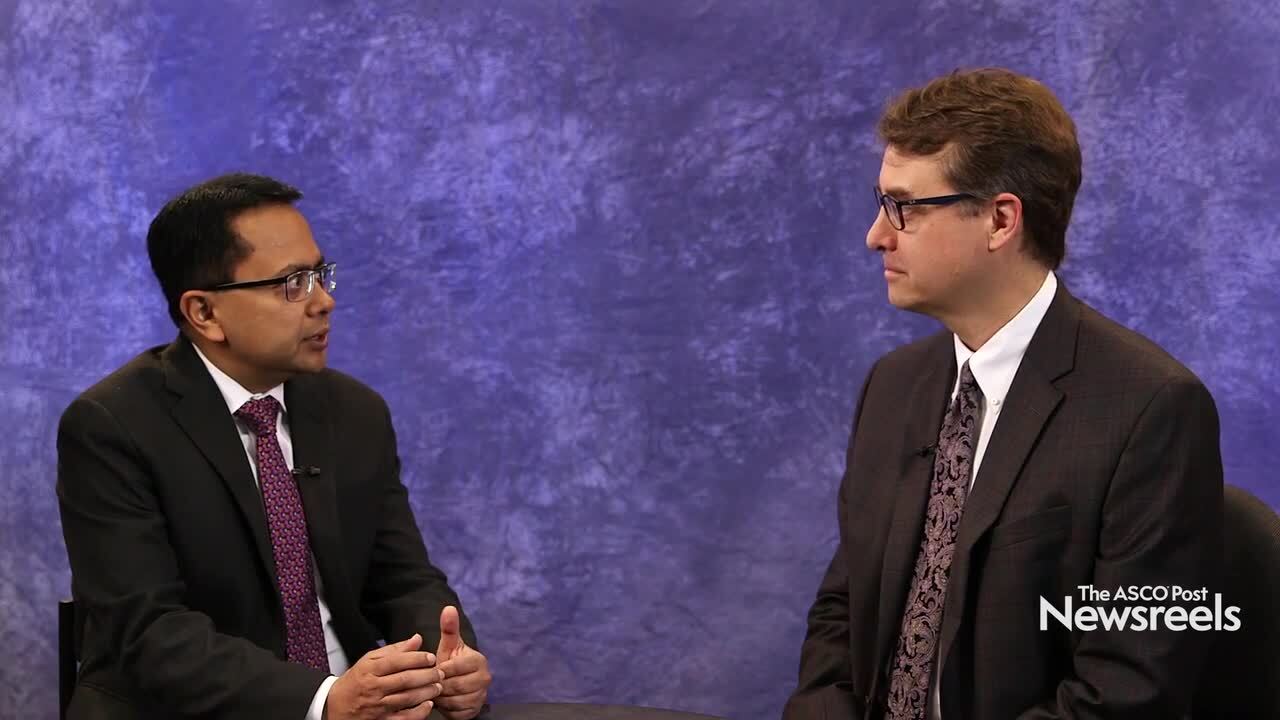Enfortumab Vedotin-ejfv for Previously Treated Advanced Urothelial Cancer
On December 18, 2019, the antibody-drug conjugate enfortumab vedotin-ejfv (PadcevTM) was granted accelerated approval for the treatment of adult patients with locally advanced or metastatic urothelial cancer who have previously received a programmed cell death protein 1 (PD-1) or programmed cell...
FDA Pipeline: Fast Track/Orphan Drug Designation for Cholangiocarcinoma Treatment, Breakthrough Device Designation for Bladder Cancer Test
This week, the U.S. Food and Drug Administration (FDA) granted Fast Track designation to infigratinib for patients with advanced or metastatic cholangiocarcinoma with a certain genetic mutation, and Orphan Drug designation to the treatment for patients with cholangiocarcinoma. The FDA also granted...
FDA Approves PD-1 Inhibitor for BCG-Unresponsive, High-Risk Non–Muscle Invasive Bladder Cancer
Today, the U.S. Food and Drug Administration (FDA) approved pembrolizumab (Keytruda) for the treatment of patients with bacillus Calmette-Guérin (BCG)-unresponsive, high-risk, non–muscle invasive bladder cancer with carcinoma in situ with or without papillary tumors who are ineligible for or have...
JAVELIN Bladder 100 Study of Avelumab for Urothelial Cancer Meets Primary Endpoint
The phase III JAVELIN Bladder 100 trial met its primary endpoint of overall survival at the planned interim analysis. In this study, patients with previously untreated locally advanced or metastatic urothelial carcinoma whose disease did not progress on induction chemotherapy and who were randomly...
Does the Addition of Ramucirumab to Docetaxel Improve Overall Survival in Previously Treated Urothelial Carcinoma?
As reported in The Lancet Oncology by Daniel P. Petrylak, MD, and colleagues, the phase III RANGE trial has shown no significant improvement in overall survival with the addition of ramucirumab to docetaxel in patients with locally advanced or metastatic urothelial carcinoma previously treated...
FDA Pipeline: Priority Reviews in SCLC, Bladder Cancer, Colorectal Cancer
Recently, the U.S. Food and Drug Administration (FDA) granted Priority Reviews for treatments in extensive-stage small cell lung cancer (SCLC), non–muscle invasive bladder cancer, and BRAF V600E–mutant colorectal cancer. The Agency also recently issued multiple Breakthrough Therapy designations and ...
FDA Approves Enfortumab Vedotin-ejfv for Previously Treated Advanced Urothelial Cancer
On December 18, the U.S. Food and Drug Administration (FDA) granted accelerated approval to enfortumab vedotin-ejfv (Padcev) for adult patients with locally advanced or metastatic urothelial cancer who have previously received neoadjuvant or adjuvant treatment with a programmed cell death protein 1 ...
Does the Addition of Ramucirumab to Docetaxel Improve Overall Survival in Previously Treated Urothelial Carcinoma?
As reported in The Lancet Oncology by Daniel P. Petrylak, MD, and colleagues, the phase III RANGE trial has shown no significant improvement in overall survival with the addition of ramucirumab to docetaxel in patients with locally advanced or metastatic urothelial carcinoma previously treated with ...
ESMO Congress 2019: Quick Takes From Key Clinical Trials
The ESMO Congress continues to grow as a pivotal platform for research in clinical oncology. At the ESMO Congress 2019, important findings were showcased in more than 2,200 studies, including 93 late-breaking abstracts. The ASCO Post summarized much of that news in separate articles over several...
IMvigor130 Trial: Atezolizumab Plus Chemotherapy for Metastatic Urothelial Cancer
Treatment with atezolizumab plus chemotherapy extended progression-free survival by 1.9 months vs chemotherapy alone in patients with metastatic urothelial cancer, according to the early results of the IMvigor130 trial, which were presented at the European Society for Medical Oncology (ESMO)...
FDA Pipeline: Advances in Prostate Cancer, Urothelial Cancer, Myelofibrosis, and More
In the past few weeks, the U.S. Food and Drug Administration (FDA) has issued regulatory decisions in prostate cancer, urothelial cancer, myelofibrosis, breast cancer, pediatric brain cancer, leukemia, and skin cancer. Breakthrough Therapy Designation for Niraparib in Metastatic...
ESMO 2019: IMvigor130: Addition of Atezolizumab to Platinum-Based Chemotherapy in Advanced Urothelial Carcinoma
Patients with locally advanced or metastatic urothelial carcinoma demonstrated prolonged progression-free survival with the addition of atezolizumab to first-line platinum-based chemotherapy vs treatment with chemotherapy alone, according to phase III data from the IMvigor130 study presented by...
Thomas Powles, MD, PhD, and Enrique Grande, MD, PhD, on Urothelial Carcinoma: Atezolizumab and Platinum-Based Chemotherapy
Thomas Powles, MD, PhD, of Queen Mary University of London, and Enrique Grande, MD, PhD, of MD Anderson Cancer Center, Madrid, discuss findings of the phase III IMvigor130 trial on the efficacy and safety of atezolizumab as monotherapy or combined with platinum-based chemotherapy vs placebo plus platinum-based chemotherapy in previously untreated locally advanced or metastatic urothelial carcinoma (Abstract LBA14).
Thomas Powles, MD, PhD, on Metastatic Urothelial Cancer: Durvalumab Plus Targeted Treatments
Thomas Powles, MD, PhD, of Queen Mary University of London, discusses the first study to examine immunotherapy and targeted treatment combinations with a personalized approach in bladder cancer. FGF, TORC1/2, and PARP inhibitors were explored in combination with durvalumab in selected patients (Abstract 902O).
The Fight Against Breast Cancer Illustrates the Health-Care Challenges of Women in Poverty
"Of all the forms of inequality, injustice in health is the most shocking and the most inhumane….” —Dr. Martin Luther King, Jr Progress has been made in expanding access to health care for low-income populations, but the quality of care still lags behind and can result in less successful outcomes...
Gemcitabine/Eribulin in Cisplatin-Ineligible Metastatic Urothelial Carcinoma
In the final analysis from a phase II California Cancer Consortium trial (NCI-9653) reported in the Journal of Clinical Oncology, Sadeghi et al found the combination of gemcitabine and eribulin showed activity in cisplatin-ineligible patients with metastatic urothelial carcinoma. Study Details...
Enfortumab Vedotin in Platinum- and Anti–PD-1/L1–Pretreated Urothelial Carcinoma
In the phase II EV-201 trial reported in the Journal of Clinical Oncology, Rosenberg et al found the antibody-drug conjugate enfortumab vedotin showed high activity in patients with metastatic urothelial carcinoma who had previously received platinum-based therapy and anti–programmed cell...
Johns Hopkins Awarded $3.2 Million NIH Grant for Early-Stage Bladder Cancer Research
Researchers at the Johns Hopkins Kimmel Cancer Center, the Greenberg Bladder Cancer Institute, the Bloomberg-Kimmel Institute for Cancer Immunotherapy, the Brady Urological Institute, and the Center for Computational Genomics at Johns Hopkins have received a $3.2 million grant from the National...
Erdafitinib in FGFR-Altered Advanced Urothelial Carcinoma
As reported in The New England Journal of Medicine by Loriot et al, the fibroblast growth factor receptor 1-4 tyrosine kinase inhibitor erdafitinib showed activity in FGFR-altered advanced urothelial carcinoma. Study Details The study enrolled patients from sites in 14 countries between May...
Conditional Reprogramming of Urine Cultures for Bladder Cancer
A research team led by investigators from Georgetown University Medical Center and Fudan University in China has devised a noninvasive and individualized technique for detecting and treating bladder cancer. Their findings were published by Jiang et al in Protein & Cell. The method uses a...
New NCCN Guidelines for Patients®: Bladder Cancer
THE TREATMENT LANDSCAPE for bladder cancer has changed dramatically over the past few years, and the National Comprehensive Cancer Network® (NCCN®) recently announced the newly published NCCN Guidelines for Patients®: Bladder Cancer, created with funding through the NCCN Foundation. The guidelines...
Ramucirumab Plus Pembrolizumab in Previously Treated Advanced Gastroesophageal Cancer, NSCLC, and Urothelial Carcinoma
Results from a phase IB trial expansion stage reported in The Lancet Oncology by Herbst et al showed the combination of ramucirumab plus pembrolizumab had manageable toxicity and antitumor activity in previously treated advanced gastroesophageal cancer, non–small cell lung cancer (NSCLC), and ...
Study Identifies Key Biologic Features of Upper Tract Urothelial Carcinoma
A new study published by Robinson et al in Nature Communications aimed to learn more about the biologic characteristics of upper tract urothelial carcinoma to help develop more targeted therapies. “We discovered the defining biologic characteristics of [upper tract urothelial tumors] that...
Actively Recruiting Clinical Trials for Muscle-Invasive and Non–Muscle-Invasive Bladder Cancers
The information contained in this Clinical Trials Resource Guide includes actively recruiting clinical research trials for both muscle-invasive and non–muscle-invasive bladder cancers. The studies listed here are evaluating the safety and efficacy of combinations of chemotherapy and...
Enfortumab Vedotin After Checkpoint Inhibition in Metastatic Urothelial Cancer
A phase II study found that treatment with the antibody-drug conjugate enfortumab vedotin achieved responses in 44% of patients with locally advanced or metastatic urothelial cancer previously treated with platinum chemotherapy and a checkpoint inhibitor. This is a noteworthy study because it...
Christopher Sweeney, MBBS, and Ian D. Davis, MBBS, PhD, on ANZUP: Taking a Multidisciplinary Approach to Prostate, Kidney, Bladder, Testicular, and Penile Cancers
Christopher Sweeney, MBBS, of Dana-Farber Cancer Institute, and Ian D. Davis, MBBS, PhD, of Monash University and Eastern Health, discuss the Australian and New Zealand Urogenital and Prostate Cancer Trials Group, working globally to speed clinical research in and treatment of urogenital cancers.
Adverse Events and Outcomes in Patients Receiving Anti–PD-1/PD-L1 Antibody Treatment for Advanced Urothelial Cancer
In an analysis reported in the Journal of Clinical Oncology, Maher et al found that treatment-related adverse events of special interest and immune-mediated adverse events were more common among patients with advanced urothelial cancer with vs without response to anti–programmed cell death...
Brian C. Baumann, MD, on Locally Advanced Bladder Cancer: Adjuvant Radiotherapy After Radical Cystectomy
Brian C. Baumann, MD, of Washington University School of Medicine, discusses study findings suggesting postoperative radiotherapy may be an option for patients with locally advanced bladder cancer after radical cystectomy who are unable or unwilling to use adjuvant chemotherapy (Abstract 4507).
Matt D. Galsky, MD, on Urothelial Cancer: Pembrolizumab vs Placebo After First-Line Chemotherapy
Matt D. Galsky, MD, of The Tisch Cancer Institute at Icahn School of Medicine at Mount Sinai, discusses phase II study findings that show switch maintenance with pembrolizumab significantly improves progression-free survival in the metastatic setting (Abstract 4504).
Jonathan E. Rosenberg, MD, on Urothelial Carcinoma: Adding Bevacizumab to Gemcitabine and Cisplatin
Jonathan E. Rosenberg, MD, of Memorial Sloan Kettering Cancer Center, discusses results from the phase III Alliance trial, which showed that adding bevacizumab to gemcitabine and cisplatin did not improve overall survival in patients with metastatic urothelial carcinoma, but did improve progression-free survival (Abstract 4503).
Neeraj Agarwal, MD, and Thomas W. Flaig, MD, on Muscle-Invasive Bladder Cancer: Predicting Response to Neoadjuvant Chemotherapy
Neeraj Agarwal, MD, of Huntsman Cancer Institute, University of Utah Health Care, and Thomas W. Flaig, MD, of the University of Colorado, discuss phase II findings on a novel predictive biomarker of response to the two accepted neoadjuvant regimens for muscle-invasive bladder cancer: methotrexate/vinblastine/doxorubicin/cisplatin and gemcitabine/cisplatin (Abstract 4506).
Daniel P. Petrylak, MD, on Urothelial Cancer: Enfortumab Vedotin Monotherapy for Locally Advanced or Metastatic Disease
Daniel P. Petrylak, MD, of Yale School of Medicine, discusses study results on enfortumab vedotin monotherapy for locally advanced or metastatic urothelial cancer previously treated with platinum and immune checkpoint inhibitors (Abstract LBA4505).
2019 ASCO: Enfortumab Vedotin Shows Activity in Previously Treated, Locally Advanced or Metastatic Urothelial Cancer
The single-arm, phase II EV-201 trial showed treatment with enfortumab vedotin—an agent targeting Nectin-4, a protein found in 97% of urothelial cancers—produced responses in 44% of patients with locally advanced or metastatic forms of urothelial cancer. Patients had previously been...
CheckMate 032: Extended Follow-up of Nivolumab and Nivolumab/Ipilimumab Cohorts in Previously Treated Metastatic Urothelial Carcinoma
As reported in the Journal of Clinical Oncology by Sharma et al, follow-up of the cohort receiving nivolumab at 1 mg/kg plus ipilimumab at 3 mg/kg the phase I/II CheckMate 032 trial showed the regimen produced high levels of activity in platinum-treated, unresectable, locally advanced or metastatic ...
Erdafitinib for Metastatic Urothelial Carcinoma
On April 12, 2019, erdafitinib was granted accelerated approval for patients with locally advanced or metastatic urothelial carcinoma with susceptible fibroblast growth factor receptor 3 (FGFR3) or FGFR2 genetic alterations, when the disease has progressed during or following platinum-containing...
2019 Updates to NCCN Clinical Practice Guidelines in Genitourinary Oncology
The 24th Annual Conference of the National Comprehensive Cancer Network® (NCCN®) was held this past March in Orlando, Florida. Updates to a number of Clinical Practice Guidelines (NCCN Guidelines®) were reported, including three relevant to the field of genitourinary oncology: kidney cancer,...
Lenvatinib Plus Pembrolizumab Shows Activity in Advanced Urothelial Cancer
THE COMBINATION of lenvatinib plus pembrolizumab has demonstrated antitumor activity in patients with advanced urothelial cancer, including patients receiving later-line treatment. Results of a phase Ib/II trial showed an objective response rate of 25% and a median progression-free survival of 5.4...
Sacituzumab Govitecan Shows Activity in Heavily Pretreated Bladder Cancer
PRELIMINARY EVIDENCE suggests that the antibody-drug conjugate sacituzumab govitecan is active in patients previously treated with chemotherapy or checkpoint inhibitor therapy for metastatic urothelial cancer. These results from a phase I/II basket study of this agent were presented at the 2019...
Adjuvant Sequential Chemotherapy Plus Radiotherapy vs Radiotherapy Alone for Locally Advanced Bladder Cancer
A phase III Egyptian trial presented by Mohamad S. Zaghloul, MD, et al at the 2019 Genitourinary Cancers Symposium focused on the benefit of adjuvant chemotherapy in patients with locally advanced bladder cancer treated with postoperative radiotherapy.1 Researchers compared postoperative...
New Drugs and Novel Indications for Genitourinary Cancers, FDA Approved 2017–2019
May 14, 2019: Avelumab (Bavencio) plus axitinib (Inlyta) for the first-line treatment of patients with advanced renal cell carcinoma (RCC). April 19, 2019: Pembrolizumab (Keytruda) plus axitinib (Inlyta) for the first-line treatment of patients with advanced renal cell carcinoma (RCC). April 12,...
NCCN Clinical Practice Guidelines in Oncology: 2019 Updates
In 1996, the National Comprehensive Cancer Network® (NCCN®) published its first set of Clinical Practice Guidelines in Oncology (NCCN Guidelines®), covering eight tumor types. NCCN Guidelines are now published for more than 70 tumor types and topics. Some of the key updates for 2019 were presented...
A Year in Review
The past year has seen groundbreaking advances in the treatment of genitourinary (GU) cancers, which in some cases are resulting in altering the standard of care for patients with renal cell carcinoma, prostate cancer, and urothelial carcinoma. Some of the biggest changes that have occurred are for ...
Does Quitting Smoking Affect Risk of Bladder Cancer in Postmenopausal Women?
A large study of postmenopausal women indicated that quitting cigarette smoking was associated with significantly reduced risk of bladder cancer. The most significant reduction in risk occurred in the first 10 years after quitting, with a modest but continued decline in later years. These results...
Ultradeep Sequencing of Plasma Cell-Free DNA in Bladder Cancer
In a study reported in the Journal of Clinical Oncology, Christensen et al found that identification of circulating tumor DNA (ctDNA) by ultradeep sequencing of plasma cell-free DNA was highly prognostic for outcome in bladder cancer and permitted early detection of relapse. The study...
AUA 2019: Studies Highlight Potential Bladder Cancer Risks
Electronic cigarettes (e-cigarettes), exposure to certain environmental factors, and human papillomavirus (HPV) infection may increase the risk of developing bladder cancer, according to new data presented this week at the 2019 Annual Meeting of the American Urological Association (AUA). The...
AUA 2019: OLYMPUS Trial Assesses Mitomycin Gel in Low-Grade Upper Tract Urothelial Carcinoma
Findings from a secondary analysis of the phase III OLYMPUS trial were presented by Kleinmann et al during the Plenary Session at the 2019 American Urological Association (AUA) Annual Meeting (Abstract LBA-16). Results showed that instillation of UGN-101, an investigational formulation of mitomycin ...
FDA Grants Accelerated Approval to Erdafitinib for Metastatic Urothelial Carcinoma
On April 15, the U.S. Food and Drug Administration (FDA) granted accelerated approval to erdafitinib (Balversa) for patients with locally advanced or metastatic urothelial carcinoma with susceptible FGFR3 or FGFR2 genetic alterations that has progressed during or following platinum-containing...
FDA Grants Accelerated Approval to Erdafitinib for Metastatic Urothelial Carcinoma
Today, the U.S. Food and Drug Administration (FDA) granted accelerated approval to erdafitinib (Balversa) for patients with locally advanced or metastatic urothelial carcinoma with susceptible FGFR3 or FGFR2 genetic alterations that has progressed during or following platinum-containing...
Lenvatinib Plus Pembrolizumab Shows Activity in Advanced Urothelial Cancer
THE COMBINATION of lenvatinib plus pembrolizumab has demonstrated antitumor activity in patients with advanced urothelial cancer, including patients receiving later-line treatment. Results of a phase Ib/II trial showed an objective response rate of 25% and a median progression-free survival of 5.4...
Expert Point of View: Matthew J. Milosky, MD
FORMAL STUDY discussant Matthew J. Milosky, MD, of the University of North Carolina, Lineberger Comprehensive Cancer Center, Chapel Hill, said there had been few drug approvals in advanced bladder cancer until 5 new checkpoint inhibitors were approved over the past 2 years. “Although these agents...








